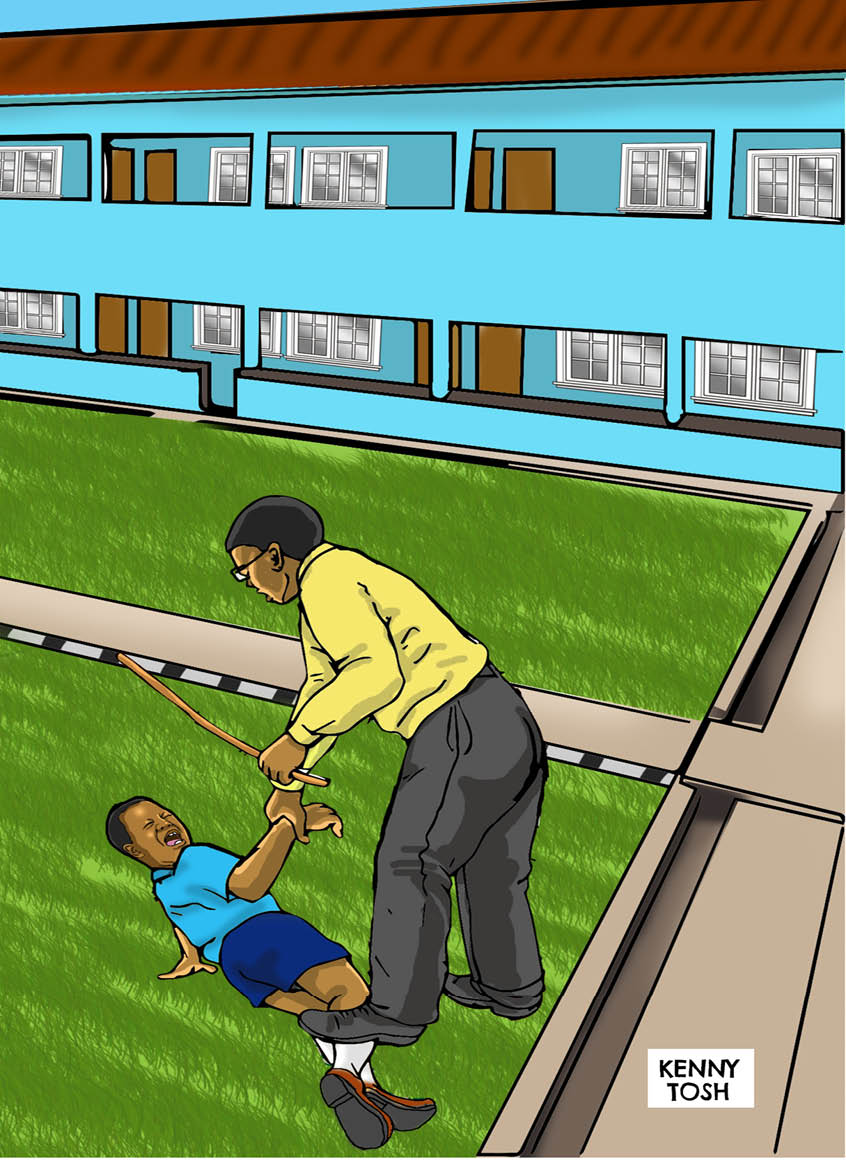A businessman from Edo State, Eromosele Oribhabor, recently raised alarm over how his nine-year-old daughter was allegedly left traumatised after she was whipped 40 times by the proprietress of her school in Delta State on the allegation that she stole N1,000 from a teacher.
In an interview with Punch newspapers, he said, “I felt the proprietress should have called me since she had my phone number. So, I was angry. I called the proprietress. She concluded that our daughter wasn’t flogged because of the missing money but because her classmates told her that she (our daughter) used to bring money, sometimes N1,000, N1,500, or N900 to school. So, she concluded that my daughter stole the missing money. She was not caught with the missing money.”
Oribhabor explained that, “We went to the school on Monday and asked her why she flogged Gina. She said she thought Gina had been stealing. When I asked her how (she knew that), she said all she knew was that Gina had been stealing and having been a teacher for many years, she could tell when a child was lying and that the only way to discipline them was to flog them.”
He, however, said they have reported the matter to the police and the ministry of education and officials told them to allow them to handle the matter.
Naira crisis: Protests rock Rivers, Lagos, Ogun, Oyo as hoodlums destroy banks
I will respect rule of law if elected – Obi
The Oribhabors are not the only parents against flogging of their wards as a way of discipline and to deter them from negative behaviours, many parents are also against it, leaving many schools and educators in a dilemma on how to discipline a student/child.
In recent times, the behaviour of some students across secondary schools has raised serious concerns among parents, individuals and stakeholders, especially when such unacceptable actions are in public domain, with the advent of phones and social media.
Many students have been found exhibiting actions that are morally and culturally wrong in schools such as stealing, fighting, sexual exploitation, cultism, abuse of other students and teachers, among others, and unfortunately many get away with them because their parents are against schools meting out corporal punishment on their children.
While many have opined that the bad behaviour is mostly because of parental failure to discipline their wards when they are wrong, as is done in the past, the parents have taken it to schools as they threaten to withdraw their wards if the authority punishes them.
However, the argument on ‘if corporal punishments should be used as a form of correcting a child’ continues, many are of the opinion that a child should be punished in order not to ‘spare the rod and spoil the child’.
Daily Trust Saturday interviewed parents, teachers and stakeholders and many believed it is the right thing to do to curtail moral decadence in the school.
A parent, Pwakim Jacob Choji, asked if corporal punishment was taken away in the first instance, saying, it is the insincerity of people that watered down the significance of corporal punishment within the public domain whether in school or community.
He said: “People don’t know what extent of punishment is punitive enough without sounding wicked, mean, and dangerous to the child’s personal safety. On the other hand, parents have become more sensitive to whether their children are disciplined or not. They are always picking up on schools where their children are reprimanded. We have heard of stories where parents have even attacked teachers and proprietors for doing the needful.”
Choji, who is the Executive Director of Youth Initiative Against Violence & Human Rights Abuse (YIAVHA), also noted that the takeover of the primary and secondary school systems by private entities has created a canopy for misbehaviour.
“Parents threaten the withdrawal of their children from school at points where their children report some sort of corporal punishment and because they run a business entity with the hope of having good return on investment, they will do everything possible to please parents and children,” he added.
He stressed that moral decadence is a function of many factors, saying, “To change the tide, we must go back to the homes. The right orientation about parenting must be gotten rightly before it can translate to the larger society.”
A teacher, Azi Aware Peter, said corporal punishment is the only antidote to the morale decadence and indiscipline that is rearing its ugly head in our schools, especially secondary schools.
He pointed out that the type of corporal punishment should be reformed a little bit with the old system, saying, examination malpractice has contributed immensely to the menace of indiscipline and examination bodies like WAEC, NECO etc have compromised their standards in which students access questions and answers of the examinations online, therefore, don’t concentrate on their studies or pay attention to their teachers.
“The rate at which social vices like cultism and gangsterism is increasing, it is only hard punishment that can deter them from joining such gangs. The core value of education is morality, and if students in Nigerian schools, especially in secondary schools, are not properly trained morally, insecurity and morale decadence will be the order of the day.
For Phillippa Edo, a proprietor, corporal punishment should be brought back to schools.
“I run a school and we discipline our pupils when they err. The aim is to correct and not to inflict pain. The Bible enjoins us to do so in Proverbs 23:13, which says “withhold not correction from the child: for if thou beatest him with the rod, he shall not die.” Pupils should be talked to sometimes but when the severity of the offence is huge, they should be disciplined but not to the extent of abuse,” he said.
“Sometimes, especially in government schools where you have a large expanse of land with a lot of uncompleted buildings, some students are seen making love and smoking. This is no small offence at all. In fact, some of them belong to a cult right there in the school. When the school authority finds out, these students should be punished, counselled and suspended or expelled from the school as they are bad examples to others,” he said.
A rights activist, Haruna Yusuf Abba, said learning means nothing without character and morality.
He said the rising cases of indiscipline in schools today cum bad character and anti-social behaviour are alarming.
“This is seriously taking the educational sector down. Today, indecent dressing from both male and female, lack of respect to constituted authority, diminishing value system, wrong/bad manners of approach, cultism and various antisocial vices are now the order of the day in schools. Most of these behaviours are often bred from a child’s upbringing, but can be corrected in schools,” he said.
Abba said any knowledge without character and discipline is a waste. “So, there is a need for corporal punishment in order to bring back sanity, integrity and good values to our educational system.”
Another teacher, Sophia Emmanuel, said corporal punishment remains the best way to curtail children’s immoral behaviour and indiscipline as well.
She argued that there should be a limit because some children have gotten used to it and don’t care anymore, noting that punishment should not only be beating or giving them some physical activities to carry out but also denying them things they cherish.
“I want to also say parents should play their role well and not leave the disciplining of their wards in the hands of teachers. Keep children away from spending more time on social media because some of the things they learn there cannot be unlearned by beating and that makes beating or corporal punishment useless,” she said.
Meanwhile, parents say the application of corporal punishment in schools is low but United Nations Children’s Fund, (UNICEF), recently said 85 percent of Nigerian children between the ages of 1 and 14 experience violent discipline in schools, with nearly 1 in 3 children experiencing severe physical punishment.
During a “National Awareness Creation Meeting on Ending Corporal Punishment in schools”, organised by the Teachers Registration Council of Nigeria (TRCN), in collaboration with UNICEF, the Fund Chief of Education Saadhna Panday-Soobrayan described the discussion on ending corporal punishment in schools as “difficult and heart-breaking”, saying, the statistic demands urgent action and is indicative of a crisis.
“Much of this violent discipline takes place in the form of corporal punishment in the very institutions that are entrusted to keep children safe, develop respect for human rights and prepare them for life in a society that promotes understanding, peace, and conflict resolution through dialogue,” she said.
According to her, the persistence of these practices contradicts Nigeria’s National Policy on Safety, Security and Violence-Free Schools, that commits to zero-tolerance to any threat to the security of life and property in schools.
Meanwhile, the Minister of Education, Mallam Adamu Adamu, recently endorsed the action plan and roadmap for ending corporal punishment in schools in line with the Child’s Rights Act passed into law in 2003, protecting children’s right to a life free of violence.
Adamu, represented by Hajia Binta Abdulkadir, noted that globally, there is evidence indicating that corporal punishment in schools have impacted negatively on attendance and learning and outcomes.
“In Nigeria, studies have indicated that corporal punishment is one of the key factors militating against retention and transition of pupils in our schools which have huge implications on the educational system and achievement of the Sustainable Development Goal 4,” he said.
Also, the Registrar of TRCN, Prof Josiah Ajiboye, said globally, there is a paradigm shift from corporal punishment in schools because of its effect on pupils, adding that the practice has been proven to be ineffective, dangerous and an unacceptable method of controlling and maintaining behaviour and discipline.
Ajiboye said: “Corporal punishment tends to increase child aggression and antisocial behaviour, lower intellectual achievements, enhance poor quality of parent/teacher student relation and cause mental health problems. Since corporal punishment tends to dehumanize children and make them feel scared, ashamed and worthless during the learning and teaching process, the time has come for it to be eliminated from both homes and schools so as to enhance positive learning.”
“It is our desire that children’s learning experience should always be positive, and never traumatic.”

 Join Daily Trust WhatsApp Community For Quick Access To News and Happenings Around You.
Join Daily Trust WhatsApp Community For Quick Access To News and Happenings Around You.


